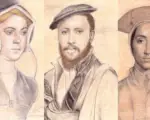
-
Artists in the Spotlight – Anthony

-
Priest Holes – Phil Downing – Live Chat Transcript

What an informative chat we had with Phil Downing. The subject of priest holes, or hides, is such an alien one for us living today, yet for a period of time, they were literally a matter of life and death for some people.
[Read More...] -
Plays with wonderful titles, Sir Ralph Sadler’s busy life, and a dying king makes his will

In this first part of This Week in Tudor History for week beginning 29th March, I talk about William Wager, a playwright and clergyman who picked wonderful titles for his works; the interesting life and career of Sir Ralph Sadler, who started out working for Thomas Cromwell and who went on to serve Henry VIII, Edward VI, Queen Jane (Lady Jane Grey) and Elizabeth I – oh, and I will tell you about his bigamous marriage! Then, finally, I will leave you with the dying King Henry VIII making his last will and testament.
[Read More...] -
A Palm Sunday Procession
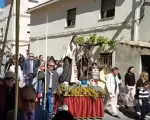
Today, Palm Sunday, is the first day of Holy Week, a day which commemorates the entry of Jesus into Jerusalem on the back of a donkey, as told in the Gospels:
“On the next day much people that were come to the feast, when they heard that Jesus was coming to Jerusalem, took branches of palm trees, and went forth to meet him, and cried, ‘Hosanna: Blessed is the King of Israel that cometh in the name of the Lord.’ And Jesus, when he had found a young ass, sat thereon; as it is written, ‘Fear not, daughter of Sion: behold, thy King cometh, sitting on an ass’s colt’.”
[Read More...] -
March Births and Deaths Crossword Puzzle

As we’re very nearly at the end of March, I though I’d test your knowledge of Tudor people who were either born or died in March. These are all people who have been mentioned in posts and videos on the Tudor Society website, but how much can you remember about them?
Test yourself with this fun puzzle.
[Read More...] -
Tudor Meals: Tarte of Apples and Orange Peels

-
April 2021 – Tudor Life – Greed
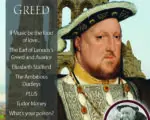
This month we’re looking into the sin of greed and it has led to this fascinating magazine.
[Read More...] -
What did Tudor people sound like?

In this week’s Friday video, I wanted to consider the question “what did Tudor people sound like?” and to share some resources on this topic with you. I’d love to travel back in time to hear them speak!
[Read More...] -
Special offers on Toni Mount’s books

I know many of you enjoy historical fiction, so I just wanted to alert you to the fact that there are some special offers on the kindle versions of the Seb Foxley medieval mystery series from today until 29th March 2021. The series is written by our very own Toni Mount, who contributes to Tudor Life Magazine every month.
To celebrate the release of her latest Seb Foxley book, The Colour of Evil, Toni’s first novel The Colour of Poison is free on kindle, and the others in the series are 99c/99p kindle countdown deals. You don’t even need a kindle because you can download the kindle app for your PC, tablet or mobile device.
[Read More...] -
Walter Raleigh’s colonisation, war over vestments, an earl who saved the day, and some burnings
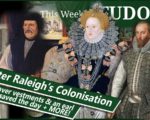
In part two of this week in Tudor history, I talk about Walter Raleigh (Ralegh) being given permission to colonise foreign lands in 1584; a disagreement over the wearing of vestments in 1566 which led to a pamphlet war, protests and ministers losing their parishes; a Tudor earl who saved the day for Henry VIII during the 1536 Pilgrimage of Grace rebellion, and the burnings of three Protestant martyrs in Essex in 1555.
[Read More...] -
Research discovers definitive likeness of Shakespeare
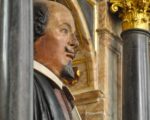
-
Margaret Ward (c.1550-1588)
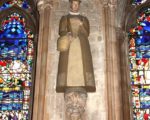
Margaret Ward was born in Congleton, Cheshire, in around 1550; however, this is an estimated guess as we know very little information regarding her early life.
What we do know is that Margaret was living in London, working in the service of a lady, when she found out about the suffering of Richard Watson, a Catholic priest who was imprisoned at Bridewell Prison. She eventually obtained permission to visit him, and over the course of her visits, the guards became less cautious. This lack of caution enabled Margaret to formulate an escape plan for Watson. Margaret’s plan involved commissioning a boatman to take him to safety after he had escaped using some rope that she would provide.
[Read More...] -
The Search For The Lost Haddington Plans
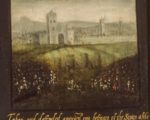
-
Henry Howard loses favour, purple fever takes an ambassador, and a Tudor judge and law reporter

In this first part of This Week in Tudor History, I talk about Henry Howard, Earl of Surrey’s loss of royal favour after the English defeat in France, but his children’s joy at the news of him returning home; ambassador Sir Henry Unton (or Umpton) who was killed in France by the “purple fever”, and Sir James Dyer, a Chief Justice who has gone down in history as the first law reporter.
[Read More...] -
An interview with Seb Foxley

A big thank you to historian and historical novelist Toni Mount for joining us here on the Tudor Society today on her blog/book tour for her latest novel, The Colour of Evil.
An interview with Seb Foxley, artist, scrivener and amateur sleuth of Paternoster Row in the City of London; hero of The Colour of … series of medieval murder mysteries.
[Read More...] -
Fish for Lent Word Search

During Lent, the time leading up to Easter, animal products such as meat, eggs, butter and cheese, were forbidden, so more fish was eaten, just as it was eaten on Fridays and other religious days.
But what kinds of fish were enjoyed in medieval and Tudor times, and how did those clever Tudors get round some of the rules and enjoy some meat?
Here’s a word search puzzle to test your knowledge of medieval and Tudor “fish”.
[Read More...] -
Celebrate spring with the two Catherine’s

-
Food in Lent

Enjoy this week’s Friday video hosted by Brigitte Webster which is all about Tudor food during the period of Lent.
[Read More...] -
A secret agent and rebel, Henry VIII’s barber, More’s granddaughter, and a Puritan soldier

In this second part of This Week in Tudor History, historian Claire Ridgway introduces Sir Christopher Blount, a secret agent and rebel who married his master’s widow and whose stepson, the Earl of Essex was his undoing; Edmund Harman, the man who trimmed and washed King Henry VIII’s hair and beard, and who was rewarded for it; Mary Bassett, Sir Thomas More’s granddaughter, who was a highly educated Tudor woman and gifted translator; and Sir John Leveson (pronounced Looson), a Puritan and soldier whose later life was marred by a falling out over money.
[Read More...] -
Artists in the spotlight – Siouxsie

-
Thomas Cromwell, Cardinal Wolsey and Wolf Hall

Thank you to Emilie and Nathaniel the dog for asking these excellent questions on Wolf Hall, and the relationship of Cardinal Thomas Wolsey and his servant, Thomas Cromwell.
Were the two men as close as they were shown in Wolf Hall?
How did Cromwell feel about Wolsey’s fall?
I answer these questions and also explain the history behind a scene in Hilary Mantel’s second novel in the series, Bring Up the Bodies, in which Cromwell vows revenge on those involved in Wolsey’s fall and in mocking him.
[Read More...] -
Edward Barlow or Ambrose Barlow (1585-1641)
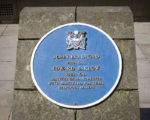
Benedictine monk Edward (religious name: Ambrose) Barlow was born at Barlow Hall in Manchester in 1585, the fourth son of Sir Alexander Barlow and his wife, Mary.
The Barlow family had converted to Protestantism, but this conversion had been somewhat reluctant. Ambrose’s grandfather had died in 1584 while imprisoned for his Catholic leanings, and his father had a large portion of his estate confiscated as a result of his initial refusal to conform to the new religion. On 30th November 1585, Ambrose was baptised, and following this, he adhered to the Anglican faith until 1607, after which he converted to Roman Catholicism.
[Read More...] -
An interview with Claire Ridgway

In this interview journalism students, Merel and Emma, ask historian Claire Ridgway about the Tudor Society, including questions such as: “why did you (Claire) start the Tudor Society?”, “Do you (Claire) have any dreams for the Tudor Society?” and a quickfire round in which you can find out who Claire’s favourite Tudor Monarch is and with which Tudor she would have a cup of tea!
[Read More...] -
The Boleyns of Hever Castle – A talk by Dr Owen Emmerson and Claire

Those of you who are in the UK or planning on visiting the UK this summer (fingers crossed!) many be interested in knowing that I will be speaking with my dear friend, Hever Castle Supervisor Dr Owen Emmerson, at Hever Castle on Sunday 1st August 2021.
The talk is on our very favourite subject, the Boleyns, and it will take place at the Two Sisters Theatre in the grounds of Hever Castle at 8pm.
Anne Boleyn’s parents weren’t the only Boleyns linked to the castle, it was connected to the Boleyn family for 77 years before it was taken by the Crown, and we’ll tell you all about its Boleyn owners.
[Read More...] -
A monk who embraced reform, a translator and soldier, and Black Will Herbert
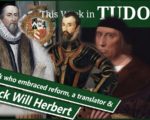
In this first part of This Week in Tudor History for the week beginning 15th March, I look at the life and career of a bishop who started out as a monk but whose conversion to the reformed faith saw him dying an awful death in the reign of Queen Mary I, before moving on to the death of a soldier, translator and diplomat in Henry VIII’s reign, and the death of a Tudor earl and brother-in-law of a queen who was once known as Black Will Herbert.
[Read More...] -
Thomas Boleyn Quiz
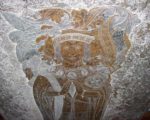
As Friday was the anniversary of the death of Thomas Boleyn, father of Anne Boleyn and grandfather of Elizabeth I, on 12th March 1539, I thought we’d test your knowledge on him.
How much do you know about this gifted diplomat and royal servant?
Find out in this fun quiz.
[Read More...] -
The School of Night or School of Atheism

Recently, on YouTube, I answered Tudor Society member Real Tudor Lady’s question on the books and TV series, A Discovery of Witches, examining whether the School of Night (School of Atheists) really existed. I thought I’d go into it in a bit more detail for Tudor Society members, and also share some further reading resources.
[Read More...] -
A pope kind to Jews, a Catholic martyr, an Elizabethan actor and a bishop supporting the Welsh
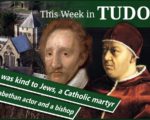
In the second part of This week in Tudor history, I talk about Giovanni di Lorenzo de’ Medici, who became Pope Leo X in 1513 and who was known as a patron of the Arts and his generosity to Jews, Christopher Bales, a Catholic priest and martyr from Elizabeth I’s reign; Richard Burbage, an Elizabethan actor who was friends with William Shakespeare, and Arthur Bulkeley, a Tudor bishop who supported reform and the use of the Welsh language in sermons.
[Read More...] -
Artists in the Spotlight – Erica

-
International Women’s Day – unknown Tudor women

